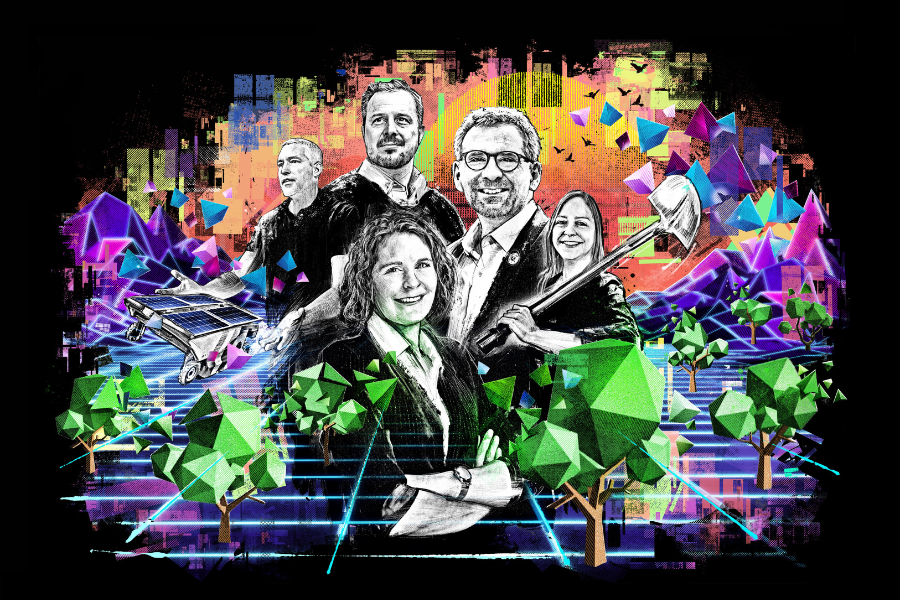Mondays could always start like this: with a croissant and café at the beautiful Hôtel de Ville in Paris, talking about digital innovation and technology – in this instance, how it transforms the way government works. The first GovTech Summit on 12 November, gathered more than 3’000 corporates, startups, civil servants, investors, politicians and academics.
GovTech is about the future of government: how it well leverage new technologies to collect taxes, deliver services, distribute welfare, maintain security and much more. Increasingly, startups are taking over activities which previously were only done by governments. They help streamline them and make them more user-friendly for citizens. My aim was to gather insights on how other countries manage the challenges posed by digital transformation, how they harness the opportunities, and learn from international best practices from other governments that could be applied in Switzerland too.
Interesting, in my opinion, is the prioritization of this topic at the highest level: The GovTech Summit was supported by French President Emmanuel Macron, Paris Mayor Anne Hidalgo and the European Commission. Hosting the 8th Internet Governance Forum and the GovTech Summit during the same week under #Parisdigitalweek sends a strong message.
Last May, French President Emmanuel Macron highlighted digital transformation by welcoming 140 of the most important tech leaders in the world at the Vivatech in Paris, and reminded them to use tech for good.
Seldom have I read an interview where a political leader was so invested in mastering a technical topic (or used expert advisers to brief him), as in Macron’s WIRED-interview on France’s Artificial Intelligence strategy.
Anne Hidalgo, the Mayor of Paris, and Justin Trudeau, the Prime Minister of Canada opened the first GovTech Summit. Macron himself was busy opening that same day the Internet Governance Forum in Paris on the topic of ‘Internet of Trust’.
Anne Hidalgo made a strong pledge to use technological progress for the benefit of all, that it should serve humans and the social good, and help tackle global challenges like climate change and the protection of democracy. In her view, the underlying values are the basis for digital transformation.
Justin Trudeau reiterated this belief and shared his vision, which is a positive and liberating one. Technologies should be used to enhance democracies and empower its people instead of undermining them and fostering polarization. He also made clear that technology can be used to the detriment of the people. He sees it as the government’s responsibility to do a better job and offer an alternative. How to empower and involve citizens on the topic of tech is key to him.
Even though Trudeau admitted that he sees developments such as AI with a critical eye and calls for a common framework in the future, Canada is making an optimistic and confident choice to become a leader in this field: ‘When faced with tech disruptions like AI, societies can either embrace status quo or ‘dive into the future, accept that there are going to be transformations but if you are faster, dig deeper, then you can come out ahead.’
China and its use of data was a popular topic throughout the summit. Trudeau believes China has an advantage through its ability to access large volumes of data, but this could be detrimental to the country’s citizens. He also proposed to establish a common framework for the ethical development of artificial intelligence.
European Commissioner for Digital Economy and Society, Mariya Gabriel recognised that people are worried about AI and privacy issues and underlined the need for common values: ‘Our citizens are concerned about AI. AI doesn’t know any borders. Our approach is on values. We need to talk about privacy protection.’
Marietje Schaake, a Dutch Member of the European Parliament also expressed concerns about the use of data in China: “In Europe, we haven’t really comprehended the fundamental challenge that China and its top down governing of technology is coming our way. We need to understand what’s at stake and start designing for the outcomes we want.”
Many speakers emphasised the need for Europe’s increased involvement in technology and to not leave this area solely to China and the US. In parallel to the GovTech Summit, French President Emmanuel Macron spoke at the Internet Governance Forum and called for a European internet, which carries European values and ideas.
With challenges such as changing demographics, ageing populations and the rise of medical costs for instance, it is in the interest of all to seek more efficient ways to afford the same level or better healthcare. The same goes for most public services. Building digital competencies right at the center of government makes processes and operations more effective and thus, creates value that serves the citizens directly. New technologies open up possibilities to the government to first understand better their citizen’s opinion and second, which services are actually used and needed. A more citizen-centric approach is the result.
Jennifer Pahlka, Founder of Code for America, in an interview with PBS calls it a ‘delivery-driven government’: “If the interactions between citizens and the government drive creation of policies and operations, it is a fundamentally different game.” She recommends to take what we have learned in the tech world and apply it to more bureaucratic systems – to hack bureaucracy. However, it is not just about creating new fancy apps for the government, it is about a new way of thinking, a system change.
GovTech and Civic Tech will certainly grow in importance in the future – especially in Switzerland, where according to certain rankings, we still fall short. The IMD Digital Competitiveness Report positions Switzerland behind when it comes to E-Voting for example.
For my part, I believe that GovTech can make government services better and serve the common good and the people. Understanding new technologies isn’t easy for everyone. It requires education and the involvement of the people to prevent a social and generational divide. And importantly, GovTech will never be a substitute for elections or citizens’ involvement. It can be a bridge and a new means to communicate with governmental officials and the administration to make processes more efficient, transparent, accessible and user-friendly.







